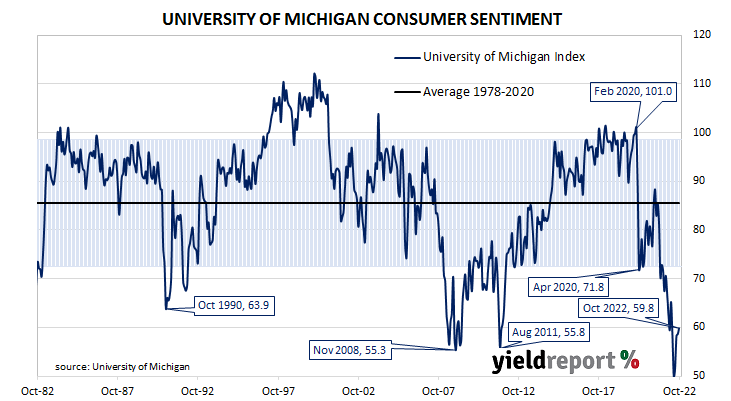Summary: University of Michigan consumer confidence index improves slightly in October, above consensus expectations; views of present conditions improves, future conditions deteriorate; “improvement remains tentative”; “unambiguous bad news” regarding inflation expectations.
US consumer confidence started 2020 at an elevated level but, after a few months, surveys began to reflect a growing unease with the global spread of COVID-19 and its reach into the US. Household confidence plunged in April 2020 and then recovered in a haphazard fashion, generally fluctuating at below-average levels according to the University of Michigan. The University’s measure of confidence had recovered back to the long-term average by April 2021 but then it plunged again in the September quarter and has since remained at historically low levels.
The latest survey conducted by the University indicates confidence among US households improved slightly on average in October. The preliminary reading of the Index of Consumer Sentiment registered 59.8, above the generally expected figure of 58.8 as well as September’s final figure of 58.6. Consumers’ views of current conditions improved while expectations regarding future conditions deteriorated in comparison to those held at the time of the September survey.
“Sentiment is now 9.8 points above the all-time low reached in June but this improvement remains tentative, as the expectations index declined by 3% from last month,” said the University’s Surveys of Consumers Director Joanne Hsu. “Continued uncertainty over the future trajectory of prices, economies and financial markets around the world indicate a bumpy road ahead for consumers.”
Short-term US Treasury bond yields moved considerably higher on the day while longer-term yields moved lower. By the close of business, the 2-year Treasury yield had gained 10bps to 4.42% while 10-year and 30-year yields each finished 3bps lower at 3.90% and 3.88% respectively.
ANZ rates strategist Gregorius Steven said “there was also unambiguous bad news” regarding inflation expectations in the report. “One year ahead inflation expectations rose from 4.7% to 5.1%, and the five-to-ten-year measure also ticked up, to close to 3%.”
It was once thought less-confident households are generally inclined to spend less and save more; some decline in household spending could be expected to follow. However, recent research suggests the correlation between household confidence and retail spending is quite weak.


